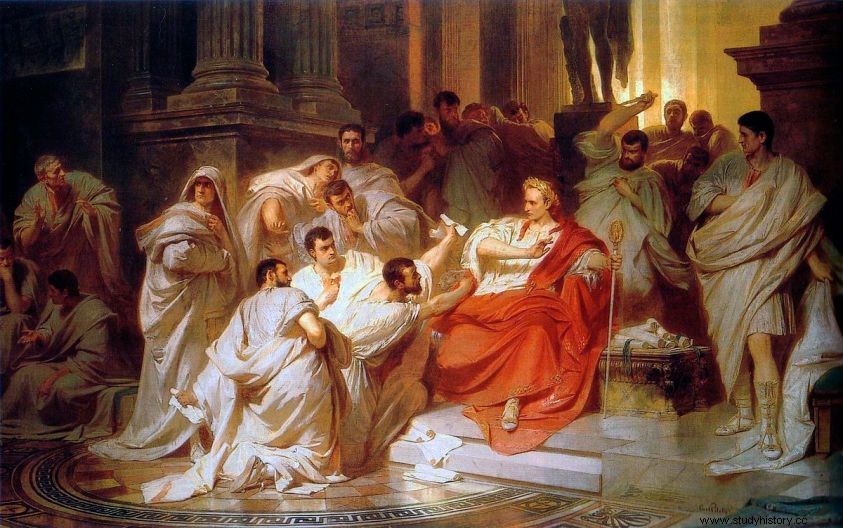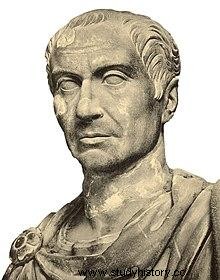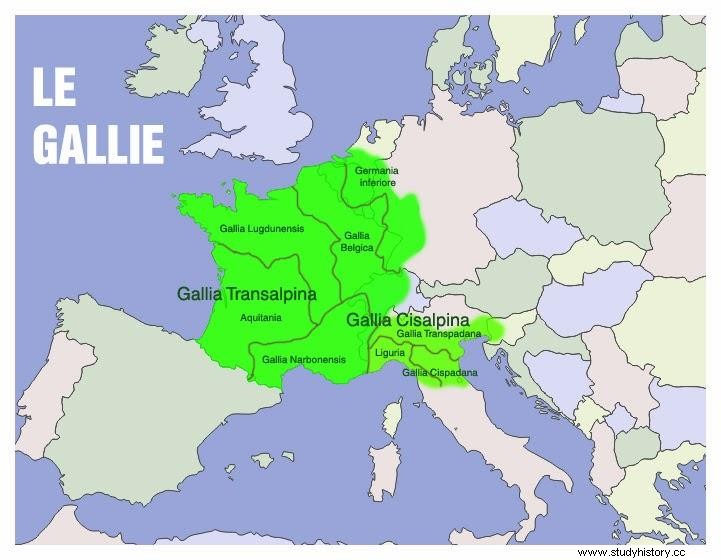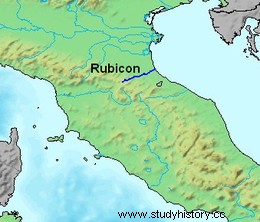
During the course of the 1st century BC the Roman Empire was on the way to unprecedented success, as it had returned from the immense triumphs achieved thanks to the victories achieved during the three Punic wars, which Rome was able to guarantee Rome a huge amount of gold and wealth. However, the Urbs , despite the evident condition of splendor and wealth in which it found itself, at the time it was the scene of innumerable power games for the control of the political framework of the Republic and, always in these years, tacitly witnessed the internal struggle between two important social classes :the optimates , a more conservative and pro-aristocratic faction, and the populares , supporters of popular demands as well as the "base" of the authority of the Tribunes of the Plebs. Therefore, continuous social tensions and violent armed clashes were on the agenda, such as the famous conflict between Clodius (faction of the populares ) and Milone (faction of the optimates ).
In this extreme climate of adversity, riots and scandals, a man stands out in Rome who will have a far from indifferent role in the political and social balance of the city. This character was, like his father, an avid supporter of the famous leader Gaius Mario ( 157-86 BC ), a Roman military and politician, elected consul of the Republic for seven consecutive times, as well as a skilled reformer as regards the military conscription and the army, as well as Tribune of the Plebs. In fact, he too belonged to the populares faction and he will represent one of the greatest examples to follow for the protagonist of this story, destined to overturn forever the historical and political scene of what will be the most glorious empire that the ancient world has ever known. This man makes one of his first appearances in a small tenement house in the Roman Suburra, one of the most infamous neighborhoods in all of Rome.

Caesar's entry into politics
Gaius Julius Caesar born on 12 July 100 BC , son of the praetor and senator Gaius Julius Caesar and of the well-known matron belonging to the gens Aurelii , Aurelia Cotta. He therefore belonged by descent to the most illustrious gens Julia , so called because it originated directly from Julo, the son of Aeneas and, according to what is reported by myths and legends, of the goddess Venus. He therefore belonged to a genealogy that we could define as "divine". Cesare immediately became a very popular character in Rome, siding like uncle Gaio Mario alongside the factiones of the populares , despite the fact that he came from a noble family, and grew up in a situation of tensions and opposing factions. All these elements probably contributed to developing his charisma and his marked resourcefulness not only in the political field, but also in the military.
In fact, Cesare spent his youth under the ruthless dictatorship exercised by Silla (the one who had previously defeated Gaius Mario), who never missed opportunities to throw digs at the boy about his excessive effeminacy. For these reasons he did not feel safe in staying in Rome, and therefore decided to leave voluntarily for Asia where, under the command of the owner Marcus Minucius Thermos, he directly participated in the war against Mithridates VI of Pontus, once again risen against Rome. This was probably one of the first events that allowed Caesar to distinguish himself militarily. In fact, in the siege of Mytilene he also obtained the civic crown, one of the most important military rewards, granted as a reward only to those who saved Roman citizens in battle.
However, what weighed heavily on status Caesar's, were the huge debts in which he found himself for some time. In fact, although his family was of some level aristocratic origins, they were by no means rich by standards of the Roman nobility, and this certainly motivated him to quickly approach illustrious and wealthy people who could help him, such as Gneo Pompeo Magno and Marco Licinio Crasso (both consuls in 70 BC ). In fact, he managed to start his famous political career thanks to the support of these two renowned citizens and politicians. Aligned precisely with the populares and endowed with an excellent charisma, he quickly managed to convince the Republic of the urgent need for radical reforms, which in order to be carried out required a strong public power in command, capable of overcoming the riches and the great power of the optimates.
His political-military path begins, as previously mentioned, in Asia, where he took part in the war against Mithridates VI of Pontus, fighting in the eastern province and enlisting ships and auxiliary militias. In 73 BC , while he was still in the East, he was elected to the college of pontiffs. Once back in Rome, in 72 BC , Caesar was also elected military tribune, even being the first of the elect. His relations were particularly close with Crassus, who helped him several times to finance his election campaigns and to pay off his numerous debts, until he was elected quaestor in 69 BC , a year after the consulate of Pompey and Crassus. Another particularly significant event was the election of him, in 65 BC , a edile curule, a position that led him to become more than definitively the new and greatest leader of the popular movement.
However, the apex of his political career is to be linked to a famous event that profoundly touched the history of Rome in the 1st century BC , or the first triumvirate . In 60 BC Caesar in fact stipulated, by mutual agreement with Crassus and Pompey (the major political leaders of the time), a private and secret agreement which, although it was not a real judiciary but due to the considerable influence of the signatories, then had enormous repercussions on the political and social life of the time, dictating its developments for almost ten years. The agreements born from this alliance, fixed in Lucca, provided for the proconsulate of Caesar in Gaul and in Illyricum with the relative command of four legions, the entrustment of Africa and Spain to Pompey and finally the province of Syria and the coveted campaign against the Parthians for Crassus who, having not yet achieved military glory, aimed to equal the success of the comrades. After dividing the territories and entrusting the relative commands, Cesare was ready to leave the Republic.
Caesar in Gaul:the military rise
In 59 BC , one year after the stipulation of the triumvirate, Caesar should have obtained the consulate, one of the highest positions in the Roman cursus honorum, a position that he managed to reach thanks to the support of Pompey and the substantial funding of Crassus. To further consolidate this triple alliance, in the same year Pompey married Julie, the daughter of Caesar. Therefore, thanks to the lex Vatinia , in 58 BC Caesar had finally left, after having obtained the proconsulate of Illyricum (it was a displaced region, where Caesar would have wanted to go to increase his military success directly on the battlefield) and Narbonne Gaul (following the death of the previous proconsul who died suddenly, Quinto Cecilio Metello Celere) and Cisalpina for five years. Although these were clearly inferior provinces compared to the sublime eastern conquests of the Empire, he still managed an interminable series of defeats among the Celtic populations, including Helvezi, Aquitani, Veneti, Belgians and Swabians.
However, the more Caesar's power increased, the more Pompey's inevitable fear of Rome grew, for the fateful moment in which his now feared opponent of Gaul would have to return to his homeland. Caesar would certainly have been acclaimed by the numerous populares of which he was at the head for his many military successes and for having also increased the number of his legions to ten, a not inconsiderable fact, a symbol of the new power and prestige he was acquiring. Meanwhile the triumvirate was slowly crumbling and, around 53 BC Crassus, lacking adequate military experience, had been defeated in the battle of Carre, had lost his Roman insignia (a terrible dishonor for a Roman commander) and had been killed by the Parthians. Cesare and Pompeo were now the undisputed masters of the Roman political scene.

Around the year 50-49 BC , the charismatic leader Gaius Julius Caesar had in fact by now conquered almost all of Gaul (a territory which now includes France and particular border areas between Switzerland, Belgium, the Netherlands and northern Italy. He also made numerous raids in Britain and Germany) and was back from a military campaign lasting almost ten years that had seen him involved in numerous victories, such as the battle of Alesia , and indisputable successes, including the defeat of the great leader Vercingetorix . However, the exploits that took place in Gaul were by no means a walk in the park for Caesar and his troops, as the Gauls opposed a strenuous resistance, also defeating the Romans on many occasions; they were proud and warlike populations, who hardly accepted a peaceful surrender. The fight against the roosters represented an enormous military challenge, which made it clear why the Roman army was the most powerful and effective of antiquity.
The riches, the glory and the confidence of an army that admired and respected him for his great charisma, were just some of the main objectives that Caesar had set himself in order to counter the growing political power of Pompey in Rome. The inimitable leadership of him it was certainly one of the keys to the Roman triumph in Gaul, as Caesar himself managed to push his army several times to carry out feats that would have been unacceptable to other generals, such as the two expeditions directed to the Isle of Britain . Also Cesare knew that the final result of his campaigns depended primarily on his troops, for this reason he established himself as an excellent motivator, capable of making his men devote themselves entirely to any commitment. Also contributing to his enormous military success were the aggressiveness and speed with which he conducted his numerous campaigns.
Political "tension" in Rome:Pompeo and the Senate
However Crassus had now left the political scene, thus determining the definitive dissolution of the triumvirate, and Pompey, clearly ahead of the years compared to the young conqueror of Gaul, had excellent reasons to fear Caesar's growing success and charisma in Rome. In fact Pompey, although he had recently obtained the office of proconsul in Spain, was still in Rome and, in 52 BC , he was elected by the senate consul sine colleague (or "console without colleague"). However Caesar possessed a large number of legions blindly loyal to him, which in turn only increased his already very high military and political ambition. The situation in Rome was therefore very tense and the civil war almost inevitable; the casus belli in fact it didn't take long to arrive.

In fact, the Senate was extremely concerned about the countless successes achieved by Caesar, whose term in Gaul was now coming to an end. Pompeo and the senate, in fact, for some time allies against the imminent danger, were therefore desperately trying to hold the reins of a political context in full turmoil, when the news arrived that Cesare would have wanted, once back home, to run for the consulate. . This office was in fact among the most coveted of the cursus honorum Roman, since he guaranteed immunity and, given the growing number of Caesarian supporters, he would almost certainly have been able to obtain it. However, Pompeo, in order to hit him to the full, in full alliance with the senate which also feared his rise, promulgated a law that would not allow him to run as a candidate, except as a private citizen. This would have meant for him to enter Rome without the army in tow, at the mercy of a man who had full power over the Republic and the complete support of the Roman senators.
The trap devised with the help of the senators, it would therefore inevitably end with the arrest of Caesar and his definitive elimination from the political scene, thus guaranteeing the exclusive consulate to Pompey, which would later translate into a dictatorship. Caesar therefore agreed to return to Rome without his troops, on condition that Pompey agreed to disband his army and all his troops. Given the precariousness and dangerousness of the situation, as Caesar, even without the support of his troops, would still have had enormous popular support (public opinion was very important, as he constituted the vast majority of the population, and the revolts were in order of the day), Pompey and the Senate did not accept the ultimatum in any possible way. of the general.
However, the Senate, with the excuse of having to protect Syria from continuous Parthian attacks, requested that two legions be added to the eastern province; Pompey at this point did not hesitate to ask Caesar for the two legions which, in 53 BC , had given him a loan for his venture in Gaul. Caesar was therefore forced to submit to such requests, thus giving up two of his legions. It was only at this point that the general of Gaul realized that the conflict was inevitable and then went with the XIII legion to Ravenna where he was acclaimed by the latter as imperator . At this point Caesar was fully exposed and on the verge of officially becoming an enemy of the res publica .
Crossing the Rubicon and the Roman civil war
The situation, already seriously uncertain before, was now at a crossroads:Caesar could in fact have dismissed the army, a choice in itself extremely dangerous as he was fully aware of the political and military forces that possessed Pompey and the Senate, or completely rebelled against the impositions of Pompey and senators, thus preparing the legions so as to be able to cross the most important political border of the Italian peninsula, the Rubicon river . This river, while not boasting considerable dimensions, represented an inviolable limit and crossing it in arms meant for the Roman generals a real violation of the laws, as well as a brazen challenge posed to the city. In fact, the Rubicon marked for a short period (between 59 BC and 42 BC ) the "sacred" border between Italy, considered as an integral part of the territory of Rome, and the not long annexed province of Cisalpine Gaul. It was therefore strictly forbidden for all Roman generals to cross it with the armed army.

But Caesar's ambition and steadfast tenacity would not have stopped, in fact the last desperate attempt of the Senate (on 7 January ) to halt his advance, resulted in an extreme ultimatum which severely ordered him to return the entire military command, ultimatum to which Caesar never yielded. In fact, a few days later, on 10 January 49 BC , he made a decision that would forever change the course of historical, political and social events in Rome and, armed his troops, he chose to cross the river, presenting himself in the city armed and close to challenging Pompey in a civil war that would inevitably be unleashed by such gesture. Caesar managed to enter Rome without encountering any kind of resistance, and this war ( 49-45 BC ) was not long in coming. Pompey was totally taken aback, and found himself forced to flee Rome as quickly as possible, taking refuge in Macedonia, where he hoped to muster a vast army to oppose Caesar.
The Roman Civil War sees Caesar as the undisputed protagonist endlessly increasing his political and military power in a very short time. The same year in fact, always in 49 BC , Cesare managed to completely conquer the Italian peninsula and defeat all the legions still loyal to Pompey in Spain. A year later then, in 48 BC , he obtained the appointment of consul and left for Greece, where, in Thessaly, precisely in Pharsalus, he sensationally defeated the army of Pompey, who took refuge in Egypt with the pharaoh Ptolemy XIII , brother of Cleopatra , who had him murdered by treason. Pompero's sons and followers continued the conflict against Caesar for a few more years until, in 45 BC , the supersed Pompeians led by Sextus Pompey (military commander and son of Pompeo) were finally defeated in Munda, in Spanish territory.
Therefore, the end of the Roman civil war represents a fundamental moment both for Roman history and for Caesar's political and military career. At this point he was able to return to Rome undisturbed and practically devoid of enemies who tried to hinder his ambitions, thus obtaining the position of dictator vitae (or "dictator for life"). This office represented a characteristic figure of the structure of the constitution of the Roman Republic, as it guaranteed absolute power and could not be controlled by any institution or judiciary. He could also suspend all other magistrates with imperium or keep them in their office, but they would always and in any case be subordinate to him. Originally he was chosen only by the patricians and, only starting from 356 BC , the dictatorship was also accessible to the plebeians. In conclusion, that of Caesar could be summed up as a real political ascent, since he started as mere miles (the miles in ancient Rome he was the simple soldier, the one who, not having a horse, had to move only on foot), managed in a short time to reach the highest and most recognized office of the whole Republic, that of dictator .
